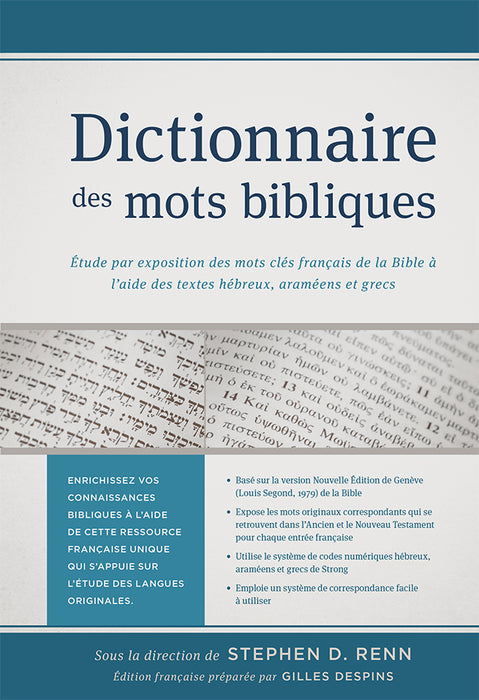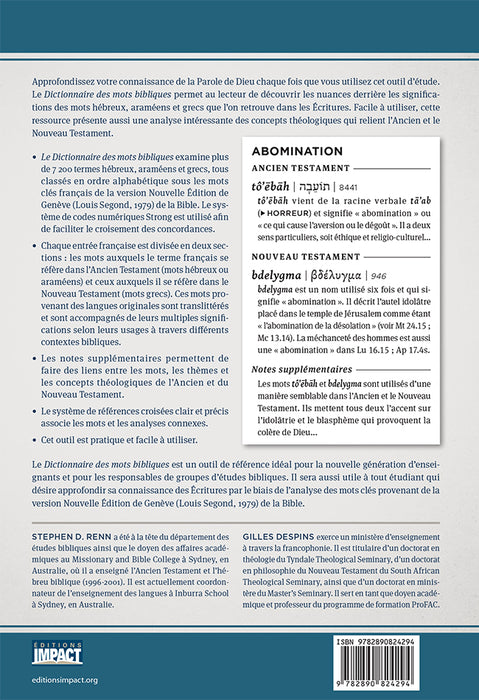
<transcy>Expository Dictionary of Bible Words (Dictionnaire des mots bibliques) </transcy>
Available: winter 2021
Deepen your knowledge of the Word of God each time you use this study tool. The Dictionary of Biblical Words enables the reader to discover the nuances behind the meanings of Hebrew, Aramaic and Greek words found in the scriptures. Easy to use, this resource also presents an interesting analysis of theological concepts that link the Old and New Testaments.
- The Dictionary of Biblical Words examines over 7,200 Hebrew, Aramaic and Greek terms, all listed alphabetically under the French keywords of the Nouvelle Édition de Genève (Louis Segond, 1979) version of the Bible . The Strong numerical code system is used to facilitate the crossing of matches.
- Each French entry is divided into two sections: the words to which the French term refers in the Old Testament (Hebrew or Aramaic words) and those to which it refers in the New Testament (Greek words). These words from the original languages are transliterated and are accompanied by their multiple meanings according to their uses across different biblical contexts.
- The additional notes help to make connections between words, themes and theological concepts of the Old and New Testaments.
- The clear and precise cross-reference system combines words and related analyzes.
- This tool is convenient and easy to use.
The Dictionary of Bible Words is an ideal reference tool for the new generation of teachers and for leaders of Bible study groups. It will also be useful to any student who wishes to deepen their knowledge of the Scriptures by analyzing key words from the New Geneva Edition (Louis Segond, 1979) of the Bible.
See an example
Abomination
Ancient Testament
tô’ēbāh [תוֹעֵבָה, 8441]
tô'ēbāh comes from the verbal root tā'ab ( HORROR ) and means " abomination ”or“ that which causes aversion or disgust ”. It has two particular meanings, namely ethics and religio-cultural. A fine example of the latter is found in Ge 43:32, where the Egyptian custom not to associate with the Hebrews is discussed. Such an association was considered an abomination in the eyes of the Egyptians, a kind of social and cultural anathema (see also Ge 46.34).
New Testament
bdelygma [βδέλυγμα, 946]
bdelygma is a name used six times which means "abomination". He describes the idolatrous altar placed in the temple in Jerusalem as "the abomination of desolation" (see Mt 24.15; Mk 13.14). The wickedness of men is also an “abomination” in Lu 16.15; Ap 17.4s; 21.27.
Additional Notes
The words tô’ēbāh and bdelygma are used in a similar fashion in the Old and New Testaments. They both emphasize idolatry and blasphemy which provoke the wrath of God. In the New Testament, the term bdelygma expresses this both in reference to the altar of the antichrist and in the pictorial description of Babylon the great. In the Old Testament, the word tô'ēbāh emphasizes the extent to which idolatry is an offense against God.
Authors
Stephen D. Renn was the Head of the Department of Biblical Studies as well as the Dean of Academic Affairs at Missionary and Bible College in Sydney, Australia, where he taught the Old Testament and Biblical Hebrew (1996-2001). He is currently the Language Teaching Coordinator at Inburra School in Sydney, Australia.
Gilles Despins exercises a ministry of education through the Francophonie. He holds a doctorate in divinity from Tyndale Theological Seminary, a doctorate in New Testament philosophy from South African Theological Seminary, and a doctorate in ministry from Masters Seminary. He serves as the academic dean and professor of the ProFAC training program.
Details
Original title : Expository Dictionary of Bible Words
Publisher : Stephen D. Renn
Edition
Publication :
ISBN : 978-2-89082-429-4
Pages :
Format : hardcover, hard cover
Weight :

